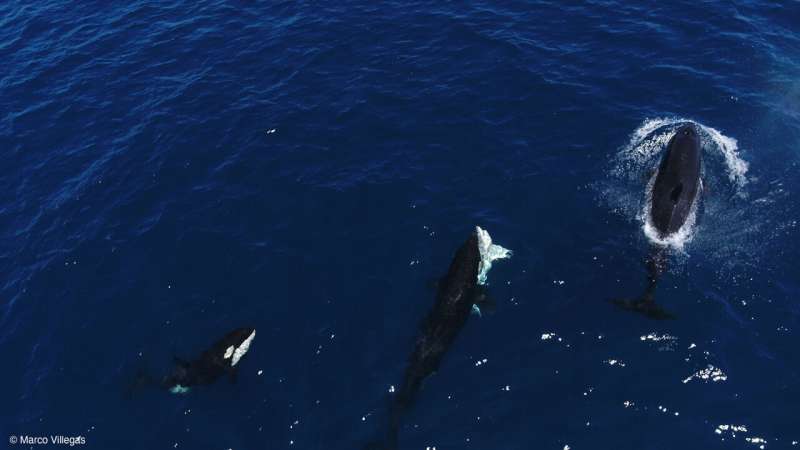Science
Orcas Skillfully Hunt Juvenile Great White Sharks in Gulf

A specialized pod of orcas in the Gulf of California has been observed hunting young great white sharks by flipping them upside down to consume their nutrient-rich livers. Known as Moctezuma’s pod, these orcas have been recorded employing sophisticated hunting techniques that suggest a significant shift in their feeding habits. This behavior raises questions about the adaptability of orcas as they respond to changing oceanic conditions.
The detailed observations were documented during routine monitoring of the orcas. According to marine biologist Erick Higuera Rivas, who is the project director at Conexiones Terramar and Pelagic Life, orcas that feed on elasmobranchs could potentially target great white sharks anywhere they pursue them. He emphasizes the intelligence and strategic thinking of these marine mammals, noting that such hunting techniques are learned and passed down through generations.
Notable Hunting Techniques
During two separate hunts, scientists witnessed five orcas successfully capture three juvenile white sharks. In the first incident, recorded in August 2020, the orcas worked as a group to flip a juvenile shark onto its back, inducing a state known as tonic immobility. This condition effectively paralyzes the shark, allowing the orcas to extract its liver with minimal resistance. Shortly after, they repeated this behavior with another juvenile shark.
A similar pattern was observed in August 2022, where the orcas again maneuvered a juvenile white shark into a vulnerable position before consuming its liver. The orcas’ ability to target these young sharks may indicate a developed technique that minimizes the risk of injury from bites, which is particularly effective with smaller, less experienced juveniles.
Implications of Climate Change
The shifting distribution of white sharks in the Pacific, possibly influenced by climate phenomena such as El Niño, may have opened new hunting opportunities for Moctezuma’s pod. Changes in the nursery areas of white sharks could lead to increased encounters with orcas, making juveniles more susceptible to predation. Dr. Salvador Jorgensen from California State University, a co-author of the research, pointed out that adult white sharks typically flee from orcas, but juvenile sharks may not have learned to avoid these apex predators.
The findings highlight the need for further research to understand the orcas’ dietary preferences and hunting patterns. This will require extensive fieldwork, which poses logistical challenges and financial constraints. Dr. Francesca Pancaldi from the Instituto Politécnico Nacional Centro Interdisciplinario de Ciencias Marinas stated that the information gathered on orca feeding behavior is crucial for identifying their critical habitats, which could inform conservation efforts and management plans to mitigate human impacts.
As scientists continue to monitor these interactions, they hope to clarify whether Moctezuma’s pod regularly preys on juvenile white sharks or if this behavior is opportunistic. The ongoing research will provide valuable insights into the ecological dynamics at play in the Gulf of California, highlighting the complex relationships between predator and prey in a changing marine environment.
For more detailed information, the study is published in Frontiers in Marine Science, providing novel evidence on the interaction between killer whales and juvenile white sharks in this region.
-

 Science3 weeks ago
Science3 weeks agoResearchers Challenge 200-Year-Old Physics Principle with Atomic Engines
-

 Politics1 week ago
Politics1 week agoHamas Chief Stresses Disarmament Tied to Occupation’s End
-

 Entertainment1 week ago
Entertainment1 week agoSyracuse Stage Delivers Lively Adaptation of ‘The 39 Steps’
-

 World3 weeks ago
World3 weeks agoGlobal Military Spending: Air Forces Ranked by Budget and Capability
-

 Top Stories1 week ago
Top Stories1 week agoFederal Agents Detain Driver in Addison; Protests Erupt Immediately
-

 Politics2 weeks ago
Politics2 weeks agoNHP Foundation Secures Land for 158 Affordable Apartments in Denver
-

 Science7 days ago
Science7 days agoOhio State Study Uncovers Brain Connectivity and Function Links
-

 Politics1 week ago
Politics1 week agoNFL Confirms Star-Studded Halftime Show for Super Bowl LVIII
-

 World1 week ago
World1 week agoBoeing’s Aircraft Production: Assessing Numbers and Challenges
-

 Lifestyle1 week ago
Lifestyle1 week agoTrump’s Push to Censor National Parks Faces Growing Backlash
-

 Lifestyle1 week ago
Lifestyle1 week agoRed Bluff High School’s Elli Nolan Named Rotary Student of the Month
-

 Health3 weeks ago
Health3 weeks agoNeuroscientist Advocates for Flag Football Until Age 14








